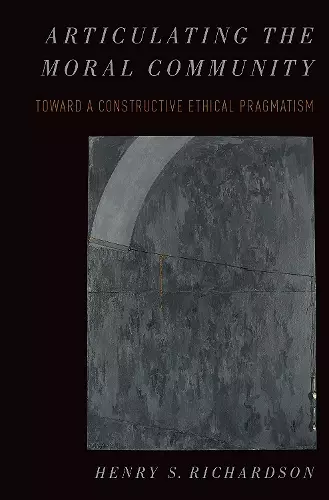Articulating the Moral Community
Toward a Constructive Ethical Pragmatism
Format:Hardback
Publisher:Oxford University Press Inc
Published:18th Oct '18
Currently unavailable, and unfortunately no date known when it will be back

Is morality fixed objectively, independently of all human judgment, or do we "invent" right and wrong? Articulating the Moral Community argues that neither of these simple answers is correct. Its central thesis is that, working within zones of objective indeterminacy, the moral community-the community of all persons-has the authority to introduce new moral norms. Unlike political communities, which are centralized, non-inclusive, and backed by coercion, the moral community is decentralized, inclusive, and not coercively backed. This book explains in detail how its structure arises from efforts by individuals to work out intelligently with one another how to respond to morally important concerns. Developing a novel theory of dyadic rights and duties based on this phenomenon, the book argues that conscientious efforts of this kind provide moral input, authoritative only over the parties involved. After sufficient uptake and reflective acceptance by the moral community, however, these innovations become new moral norms. This account of the moral community's moral authority is motivated by, and supports, a type of normative ethical theory, constructive ethical pragmatism, which-to use an unfashionable distinction defended in the book-rejects the consequentialist claim that rightness is to be defined as a function of goodness and the deontological claim that principles of right stand fixed, independently of the good. It holds, rather, that what we ought to do depends on our continuing efforts to specify the right and the good in light of each other.
clearly written ... well-researched * W. Simkulet, CHOICE *
In the impressive Articulating the Moral Community, Henry Richardson argues for a dynamic idea of morality as at once resting on an "objective core" and able to be responsive to challenges that come from new technologies and our expanding moral awareness. The argument is rich, fully engaged with current normative and meta-ethical discussion, and filled with instructive examples that demand new standards of response. Centering the argument in the idea that the community of persons has the authority to extend morality, while preserving the objectivity morality requires, Richardson offers us a powerful alternative to standard forms of moral theorizing that compels our attention. * Barbara Herman, University of California, Los Angeles *
Morality is a social institution, created and developed over time in complex ways. At the same time, it is a rational institution, aiming at objectivity. Henry Richardson, one of the foremost moral philosophers of our time, shows how these two aspects go together from the perspective of constructive ethical pragmatism. There is moral progress and innovation, as he shows, and there is progress in philosophy, as this book proves. * Rainer Forst, Goethe University Frankfurt *
ISBN: 9780190247744
Dimensions: 157mm x 239mm x 25mm
Weight: 590g
328 pages